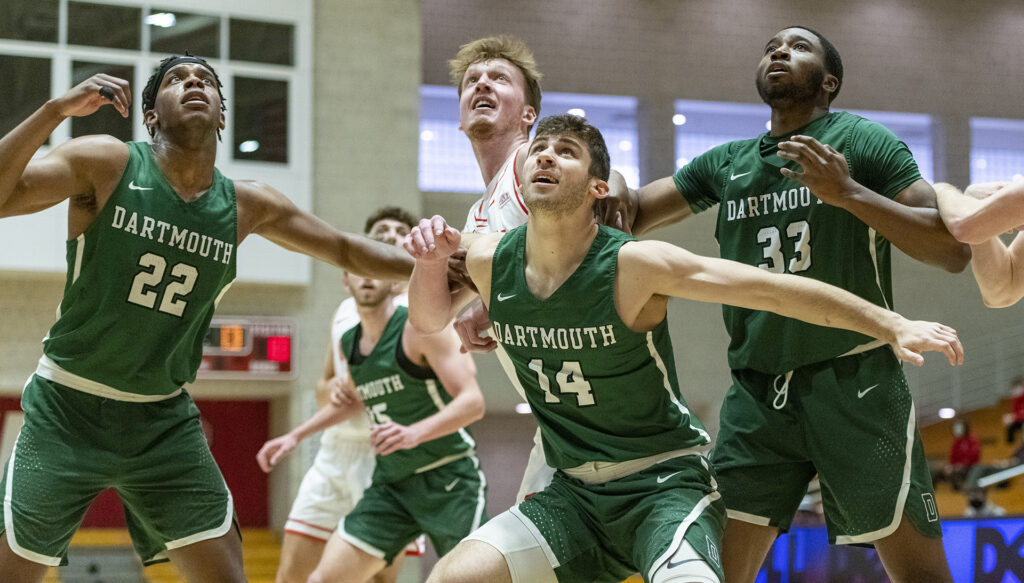
March Madness being the unpredictable spectacle that it is, underdogs become heroes and giants fall in the blink of an eye. It’s this erratic yet entertaining character that makes it one of America’s premier athletic contests. In the midst of this grandeur, though, our Big Green must once again partake from the sidelines. The basketball team having completed the season with a 0.222 overall win percentage, Dartmouth’s accomplishments contrast, if I might say so, quite embarrassingly with Yale’s nationally-followed stunning upset victory against the Auburn Tigers. The Bulldogs were promptly eliminated in the second round by San Diego State, but that’s much more than we can say about our own team.
Dartmouth’s basketball team finds itself in a perennial state of missing out, to put it mildly. Year after year, as the March Madness tournament unfolds and brackets are busted, the Big Green watch wistfully as their Ivy League brethren steal the spotlight. The Big Green have the longest streak of missing the tournament, with their drought extending all the way back to 1959. In fact, since 1959, the Big Green have had only ten winning seasons, with their last winning season being in 1999, which witnessed a modest 14-12 record
But, apparently unbothered by the lack of wins or at least oblivious to practice and improvement, the Big Green have claimed a different spotlight of their own. As previously reported in The Review, the men’s basketball team voted on March 5 to form a union in a 13 to 2 vote. Very few cases have ever been recorded of student-athletes attempting to unionize, and none have been successful. Thus far, as per the National Labor Relations Board’s ruling, the athletes can be classified as employees because of Dartmouth’s status as a private institution.
When this story came into national news, an Associated Press-NORC Center for Public Affairs Research poll found that 55 percent of U.S. adults are against student-athletes forming unions that allow them to collectively bargain as employees. As the Yale Bulldogs revel in the glory of their own oft-reported upset, the Dartmouth team stands against the tide of public opinion (although such opinion is admittedly not as decisive as my reading of the room had led me to presume). The two teams are in different boats, as it were.
The Big Green have also failed to claim support from current undergraduates, whose Fizz posts have mocked the massively-disappointing players’ move to gain relevancy off the court without making improvements on it. Whether or not they deserve the status of employees is a matter for another time. But, on the whole, Dartmouth students expect a winning team before that possibility could be entertained. They may in fact have even alienated their fans, although it might be impossible for their attendance totals to drop below where they already are.
I would venture to guess these athletes hope to act as a trial for the larger movement toward unionization. Yet they fail to acknowledge the consequences of their demands. When you have a horrific half-decade, and we don’t use these words lazily, such unionization attempts lead to greater scrutiny and disgust. Beyond the political and economic implications of the team’s vote, and there are plenty, they have also thrown their reputation into question. In an attempt to steal the spotlight that their performance leaves unilluminated, they have instead shone a light on their own failures and drawn criticism as a result.
March Madness has put Yale in the news for far more optimistic reasons than Dartmouth was just weeks before. Perhaps the tournament can offer the Big Green a valuable lesson: Their energy would be better spent on athletic training and improving their record than on seeking compensation for poor performance. It’s quite comical (and typical) that bad workers would unionize, but maybe at least this embarrassment will give them newfound inspiration to win some games.

Be the first to comment on "Big Green Men’s Basketball Misses March Madness for 65th Year in a Row"